


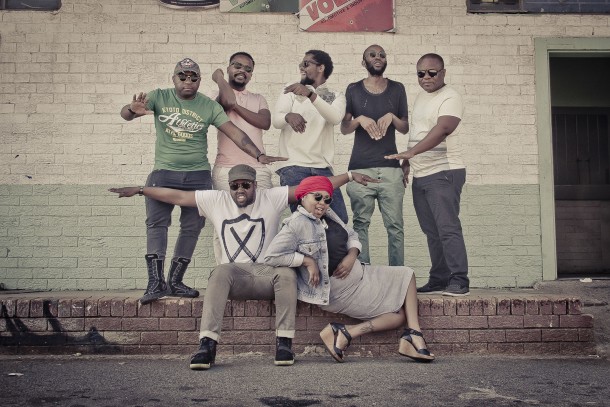
photos (c)Jeanne Abrahams
Following their first releases, a tribute to the Zimbabwean songstress Chiwoniso (“Zvichapera”), some reissues of obscure South African library music from the early 80’s and a collaboration between the Mbira master Jacob Mafuleni & the French producer Gary Gritness, the French record label Nyami Nyami has just issued the first LP of the South African band BCUC (Bantu Continua Uhuru Consciousness). A kind of afropsychededic mix of deep afro free jazz with energetic electro funk rock, whom sounds more or less like nothing else! That’s why we decided to make a long stop with this band strongly rooted in their community and naturally open to the world.
How did you create this band? What did you do before?
Before the band existed most of us were students at tertiary except one us who was already a theatre practitioner and a session rapper in the hood. By luck, coincidence, rebellious mindedness and a similar fashion sense, the indigenous music gods made us to meet each other. We used to meet at Thokoza Park for spoken word and musical jam sessions. Somebody spotted us and booked for our first gig as a collective, from that day the band was born.
Why did you choose this name: Bantu Continua Uhuru Consciousness? And why do you mix onto different languages?
Besides that the name is long, unpretentious and a mantra to the path that we choose it became clear and notable that words like Bantu (humans) Consciousness, Aluta Continua, Not Yet Uhuru, kept on appearing a lot on our freestyles. When the day came for us to choose a name in most of the suggested names all these four words kept on appearing. So we decided to partner these words and make them the name of our band.
The mixing of languages is not conscious choice, when you live in the townships of South Africa you are exposed to all eleven official languages and numerous slangs from all over Africa (sometimes the world) depending on how near you are to the major cities.
And did you change of formula since the starting?
The formula has never changed because there was never a formula. We always created music that is directed to the subconscious and the souls of the people that we are, the people we are talking to and the people that we can become (music for the people, by the people with the people). We are still talking about the same subject matter, what has changed is we have gained more patience, we are not looking for anyone to rescue us or open the doors for us anymore. We know that our content is extremely heavy and extremely secular at times, i.e. we are capable of understanding and not arguing with notions that can come from the far right or far left. All in all we have made ourselves to be basic, random, spontaneous and most importantly accepting. What we have become is a template for a soul of a world travelled, spiritually versed human being, who is not going to sit on the side lines and complain abut the problems of the world because we are the change that we would love to see. Sonically the soundscape does not really matter to us because even if you give us instruments from the Far East or ancient Europe or anywhere in the world for that matter, the music that we will make will sound like our state of mind. We sound like amazing people from Soweto making amazing music for amazing people of the world. So much has changed in terms of personnel, musical instruments and the fusion of genres if we can start talking about that it will be an anthropology workshop of modern African music.
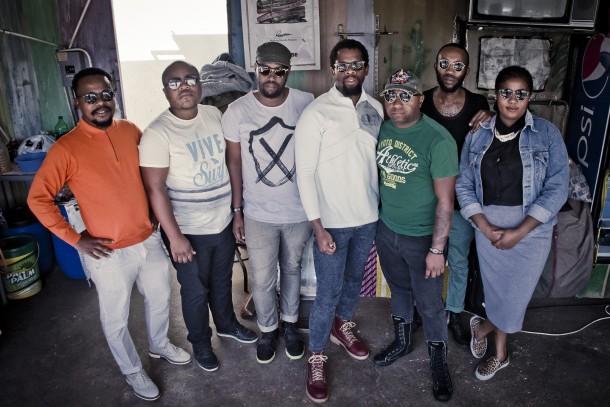
What were your mentors, references, and influences?
Our mentors have either passed on or they were never appreciated whilst they were still practicing their art, their spiritual journey, and their academic endeavors or just before they lost their minds. We are big fans of tribal war songs; traditional ceremonial songs, old church music (very old!), fantasy movies and book characters also inspire us. Fela Kuti is a big deal for us, Mystical Revelations of Rastafari is a big for us, Oumou Sangare, Bueno Vista Social Club, Mahalia Jackson, Nina Simone, Otis Redding, Howlin Wolf, Mahlathini and The Mahotela Queens, Thandiswa Mazwai her whole life from Jacknife to Bongo Muffin. We are not big fans of political figures or religious figures although we find some very interesting and we can learn from them, we just never give mention because politics and religion have caused more wars and are a sensitive subject and we respect that (now of late).
The short introduction of this record insists about the fact you are strongly connected to community… What sense to give to this word, community? Something obviously based on social reality? Something connected to a common spiritual vision?
From day one our band was built either from the shoulders, the feet or the hands of people who did it before us it, being indigenous music, indigenous ways of life. All through our history there were people who dealt with the transformation from the old to the new world using the present world as a medium of communication. With this project we made sure that we reach the source of our entire belief system as a band, we tackled our fears by producing the sound that we forever wished we can make, we just went into the studio and performed instead of recording. This resulted in the whole recording becoming an introduction to the energy that is driving us. In our eyes we see the world as professionals that are in the matrix of exchanging services from one professional to another, that is our community. A broad based worldview from our micro locations. Yes we are Africans going through our African lives but through this EP our African lives become part of the world musical ecosystem in that ecosystem we wish to become part of the team that deals with healing the world. Obviously our truth will not sit easy with everyone at the same time but our truth carries everybody’s truth with ease at the same time.
What are your links With the Joburg scene? Do you work with some artists from that scene? Where do you play on stage?
In Johannesburg if you consider yourself a person who knows what is going on and supports the live music scene, it is almost impossible not to know who BCUC is. We are mostly popular amongst artists, fashionistas, photographers and we are respected by other bands. The love that we get from our peers in the industry is so special to us because if you are appreciated by people who do what you do it means you are on a good path. We have worked with Jet Black Camaro on an amazing song called Ayikh’ into Esingayenza (https://youtu.be/eI3v6HO8cm8), and now recently we are about with collaborate with The Black Cat Bones on a set for A Place in The Sun Festival and that is very huge for us because they have been doing this for so long. About where we play we think the good question is “where haven’t we played in Johannesburg?”
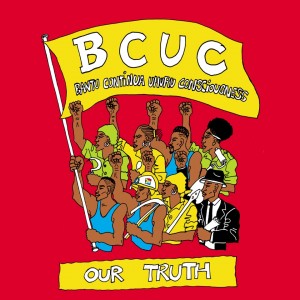
You give à name to your aesthetic view: Africangungungu… What this word cover? À kind of original mixture of rap and roots music, electronic and organic, free jazz and punk rock?
It is exactly that and when you hear it goes “Ngungungu” with all its African mighty sound.
Those record sessions sound as long improvisation… Was it that? And by improvising, do you want to catch the intensity, the necessity, the urgency, of the instant, live and direct?
As we have explained we decided to go into the studio and perform. In all our shows we prepare a skeleton that means, we pre-arrange the song structure then we put meat on the skeleton. The meat in these sessions is the state of mind that we find ourselves in. Each and every performance carries with it the burden of solving a problem or dealing with the challenge that presently we are undergoing in our daily lives from our base camp (Soweto). We are spoken word practitioners, we are roots musicians, with that comes spontaneity that automatically means a lot of improv. That right there is what makes us who we are as a music band. We are the original spirit of Jazz, we are the foundation of Rock and Roll. Every time when we do music we showcase our ability to anticipate every contribution that each member of the band brings to the table at that moment in time. BCUC is an experience that uses music as a vehicle to maneuver and negotiate the storms of human relations for the purpose of better understanding across colors, social classes and locations. So every time that you hear us we are playing a song that has an ability to become what is needed at that moment in time. We are the descendants of a people that belong to tribes that use music as therapy.
How and where did you record it?
“Yinde” was recorded in Gauteng, Springs at Markon Recording Studios. www.markonstudio.com. How it came about was they were opening a new recording studio and they wanted a variety of bands that differ in genres, to come and record in their studios so that they use these recordings to market their studio capabilities. Fortunately we were one of the bands that were chosen.
“Asazani” and “In My Blues” were recorded in Cape Town at Popsicle Studios www.popsiclestudios.com. Pospsicle Studios usually record sessions where they invite artists to use their studios then use that material for their online TV channel. That channel helps artists by providing with high tech studios and video.
The title of the LP is ‘Our Truth’… Could you tell us more about it? What is your vision, version, of the truth?
Our truth is we all want the same thing. To wake up, start your day in good way and be successful then go to sleep happy and satisfied that you have done something.
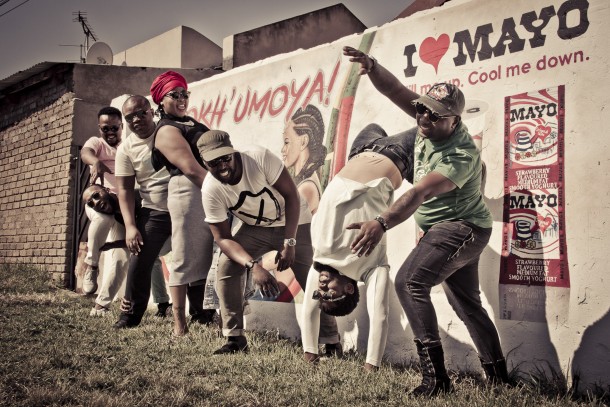
Many people talked about rainbow nation… In reality, it Sounds different, less mixed than we could Hope in nineties. Do you believe music could help to create that open mind society?
Yes music can create an open minded, united, hard working society because the music industry is open minded and full of successful people doing what they love with the intention of changing peoples lives. So if music is curated well, if musicians care and fill their music with love, the people that are listening to their music will in turn fill their lives with love. Love is not a fantasy or a dream; love is working everyday for the affection of the people you care about. Love is not perfect, love includes conflicts but because you care about each other you come out of the conflict united because you are not fighting to win or to destroy, you are fighting for mutual understanding. In love there are long-term goals, in love there is no life without one another, in love there is a foundation for the future of what lovers create. About the “rainbow nation”, the thing that made the rainbow nation idea not to be successful is (not was) the inability of what was written to be translated in real life. Whenever anyone says “rainbow nation” you get the sense of political compromise whilst in real life we need to be straightforward and stop beating around the bush. South African history is not pretty, a lot of bad things were done to the people by the people, there is no way we can behave like nothing happened, Apartheid is our common ghost, it does not matter if your heritage is as a doer or your heritage is as a “done to”, without the conversation between common people across professions our future is bleak. What we usually say is be a good employer, be a good employee, be a good friend, be a good neighbor, be a good parent, be good company. If you combine all of that as the people of this country then there will be a bright future for all of us. If we are all good (we know its hard, we know we put ourselves first) but if we can remember to be good then no rainbow will be needed. Good people do not need heroes because good people they already are heroes. This question is another one of the many about South Africa that needs their own anthropology workshop. It is a global socialization conundrum that needs a different solution because South Africa works in a different dynamic as far as history, race and numbers are concerned.
This EP is the first international issue… What do you expect? What does that change?
We would be lying if we said we don’t expect bigger things but luckily for us we always expect bigger things from ourselves. Whatever happens will happens because it is time for it to happen. We never chase success that is why we never fail. As we usually say “what it is, is what it is”.
Did you go, play before outside South Africa?
Yes we have toured the Netherlands, Belgium, Spain, Tenerife, The Canary Islands and recently the Reunion Island.
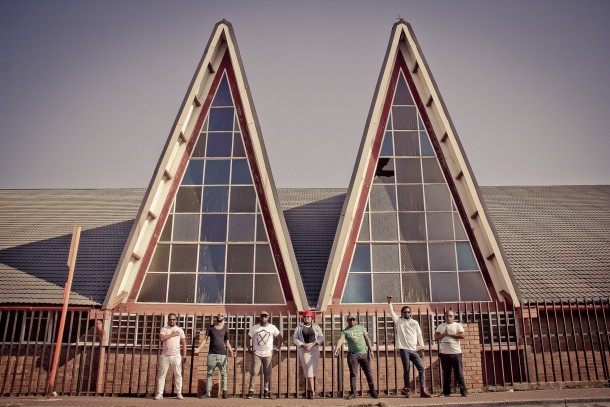
“Yinde”, which opens “Our Truth”, means “the road”: a symbol of the distance left to cover towards a fairer South African society. Is it long way? And how could it be possible to reduce this distance?
Unfortunately there is no short cut but fortunately there is no set destination that means there is no need to calculate the duration. All we know is that there are quite a number of problems in South Africa and some people are anxious and panicked and they have a right to feel that way, we just happen to be the voice of calm in the storm. Because of our make-up, and the type of families that we come from, we have the ability and the trust in ourselves as a band and as a country that we have seen this before or we have been told about these times in a form of prophecy and folk tales. We have to weather the storm, take what karma has in store for us gracefully. We need to be a solution based society because the blame game is very easy but the danger of this easy blame game is that it leads us to division.
Is it harder to live in South Africa today than ten years ago, when dreams were still available?
Ten years ago we were ten years younger, we didn’t have this financial burden that we find ourselves having now. At home they still had no problem providing for us, so if we didn’t age for ten years we would have been in a perfect position to answer this question right. All that we know is that South Africa is beautiful, the people want to make this work, and the politics are still the game. Luckily for us now we do not have time for games, life inside our homes is real it needs solutions that no government can give, no funding can give, no aid can give. We need a simple, introspective solution, whether we like it or not we are part of the global community, by virtue of he who has the money makes all the rules. Start by understanding that and learn the harsh realities of life, stay healthy, be remembered with a smile then you will fix your life ten years from now.
What is the best way in order to change the audience’s minds. By creating an original, creative, mix? By writing protest songs?
We wish we knew. What we know is who we are, where are we coming from and where are we going to. With that as a framework we look at who can potentially be offended and we devise a preventative measure so that we do not repeat the same mistakes. That way every time that we are on stage we are always on point, we do not compromise ourselves, we do not go around subjects we don’t choose names, we are always firm, fair, kind and straight to the point. We make amazing traditional musical ceremonies of very special proportions.